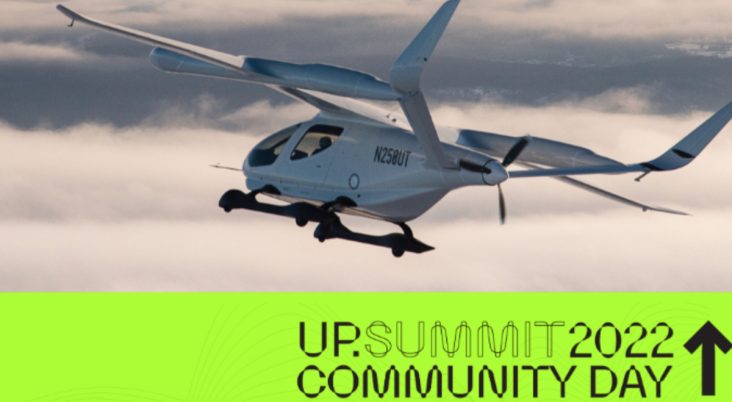Technology, mobility execs gather in Bentonville at UP.Summit
by June 7, 2022 5:44 pm 2,903 views

More than 250 global technology and mobility executives are gathered this week in Bentonville at the UP.Summit first founded by aviation entrepreneur Cyrus Sigari in 2017. The annual invitation-only summit rotates annually between Bentonville, hosted by Tom and Steuart Walton, and Dallas/Fort Worth, hosted by Ross Perot Jr.
The event is sponsored by Walmart, Wisk, Airbus, Boeing and ARK Invest.
Leaders from more than two dozen companies are speaking at the event Tuesday and Wednesday (June 7-8) at Crystal Bridges Museum of American Art. The focus of this year’s summit is the future of transportation using technology advances with a focus on cleaner, faster, and lower-cost mobility options over ground, sea, air and in space.
Alice Walton, philanthropist and daughter of Walmart founders Sam and Helen Walton is a fan of mobility and welcomed summit attendees at Crystal Bridges on Tuesday.
“When my family moved to Bentoville there were about 2,000 people here. This museum where we are standing today was outside of town. We lived on a dairy farm and Walmart was not a national name, nor was J.B. Hunt or Tyson Foods. But this region sought change,” Walton said.
Walton said she believes the poorer the soil, the richer the people in that they have to be better and they have to be innovative to survive. She said this is how she sees Northwest Arkansas.
“Companies here know how to work together and support one another. The secret sauce of Northwest Arkansas is community,” Walton said.
She said more than 30 years ago top business minds in the region formed the Northwest Arkansas Council with the initial goal of getting a greenfield airport outside of Bentonville. She said the airport has been crucial to the ongoing growth of the region and it was the first greenfield airport built in 50 years when it opened in 1998. With respect to Crystal Bridges Museum, Walton said it took several years to get her family on board with her big dream but they did come around and agree that the sacred family land on which it is located should go for the public good.
“I didn’t really know how big this would become but my momma always said give me the thing you love the most. As a kid I always loved art and that’s how this museum came about,” Walton said.
She said it was important to her family that museums be owned by the community and that admission would always be free so that there could be equal access to art for all.
“Crystal Bridges is the intersection of art, nature and architecture where the American story is being told,” Walton said. “I had no idea how big this dream could be but we anticipated about 100,000 to 200,000 visitors annually and in our first 10 years we have welcomed over 6 million. We anticipate 1 million visitors this year.”
She gave an open invitation to those visiting to come back often and possibly stay on as the people in the region know how to take care of and support one another.
“I left here once, but I have reclaimed it and I am a come-backer,” Walton said.
She recently handed over her museum oversight duties to Olivia Walton, the wife of her nephew Tom Walton, so she could focus on the next dream to transform health care in the region and state with the Whole Health Institute coming to the grounds of Crystal Bridges in 2024.
A number of company executives spoke in the morning session on Tuesday about the needs and challenges of innovating for greener, automation and mobility. Innovation and pilots are being conducted on everything from Class 8 trucks that will use compressed natural gas to deliver long-distances to drone deliveries to drones making life-saving deliveries of blood in Rwanda.
Walmart runs the largest private trucking fleet in the U.S. with more than 10,000 tractors and 80,000 trailers operated by 12,000 drivers who log an average of 100,000 miles annually. The retail giant is in the midst of testing several technologies with multiple vendors and Fernando Cortez, senior vice president of transportation at Walmart, said the retail is looking at reducing its carbon emissions across its entire fleet.
Zipline CEO Keller Rinaudo said drones have been able to go places no other transportation mode can and his company is helping to solve logistics challenges across Africa delivering just-in-time blood, insulin, COVID-19 vaccines and and other meds to clinics in Rwanda, Kenya and soon Nigeria, Japan, and three states in the U.S., including Arkansas.
Zipline drones have safely flown 45 million miles and delivered seven million products. He said every two minutes someone is getting a Zipine delivery. Zipline partnered last year with Walmart to make drone deliveries from the Walmart Neighborhood Market store in Pea Ridge. He said the deliveries began with health aids but have since evolved to include 12,000 items in the store and soon to be 28,000.
The partners also tested a robotic device from Serve Robotics that could take the orders from the store to the drone flight station behind the store where they are transferred onto the drone.
Rinaudo said drones can fly in all types of weather and while they offer some efficiency savings for U.S. companies their implications are far greater in countries like Rwanda and Kenya where the deliveries can mean the difference between life and death.
